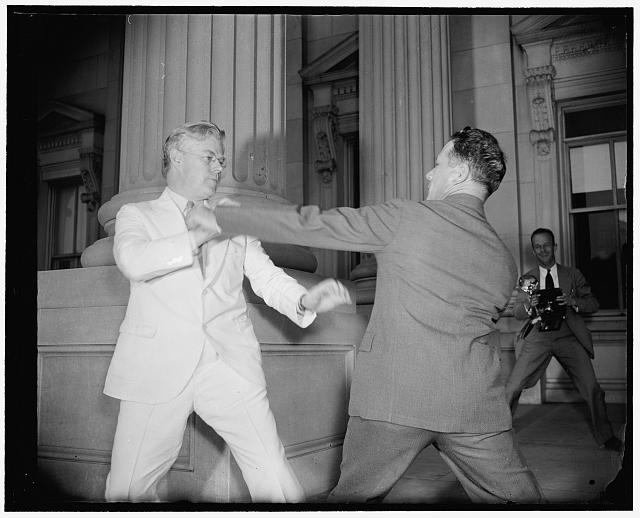One of the major things this blog tries to track is cultural changes, or trends. Here's one that I've been able to notice a great deal in my own lifetime. A decline in civility.
Others have noted this, but I think I'm likely defining this a bit more broadly than it usually is. I'd define civility as a conduct not only limited to actions, but also to manners of speech. If that is done, the decline in civility has been enormous.
When I was younger, people were generally fairly careful with their speech. We were taught not to use coarse language of any kind. This included not only swearing, and language which would have been regarded as subject to religious concerns, but simply course language. You did hear it, of course, but not terribly frequently. If you heard it from adults, it was usually because they were in a situation that was extremely stressed. From some adults you never heard course language. I do not recall hearing such language from my mother on more than a single occasion, by which time her mind was failing. If my father ever used such language, it was a sign that he was extremely upset, which was very rare. During my father's entire lifetime, I probably heard such language used less than I hear it from some individuals in a single day, in some circumstances.
There were, of course, people who routinely used very course language, but that tended to be regarded as a sign of a certain character defect in the individual or, in some cases, indicative of a certain employment or cast. That is, you might expect it from soldiers. You didn't expect it from just about anyone else. If you heard it from a manual laborer they were regarded as a person who was unaware of the appropriate standards of conduct. If you heard it from a professional, you placed them in a poor light.
You did tend to hear language of this type from boys in their late teens, which was at a point where they were experimenting with speech. But that was expected to clear up.
Now I'll hear speech of this type all the time. Even professionals can be found using language that was formerly the province of Marine Corps Drill Sergeants. It hasn't been a good trend. For one thing, it seems to have reduced the meaning of such language entirely. For another, it seems to have been part of, even an engine of, a general decline in standards. As civil language had declined, civil conduct has also.
Part of that decline has been reflected in the expansion of suggestive everything. Even 15 years ago a person wouldn't have decorated their vehicles with suggestive or crude stickers. Now I seem them everywhere. Rude t-shirts have also been common, challenging the viewer with provocative or combative suggestions. This just wouldn't have occurred up until about 15 years ago, and certainly not 20 or more years ago. For one thing, chances are high that a young male wouldn't have been able to find a young female would would have been willing to be seen with him if he had a suggestive sticker on his vehicle, or if he wore a t-shirt with a suggestive slogan. Now, however, young women wear t-shirts themselves with suggestive slogans on them.
It'd be easy to blow this off as really meaning nothing, but it does. A culture that loses a sense of propriety on certain conduct will tend to lose a sense of appropriateness as to any behavior at all. That is, if a person doesn't know what language is and is not appropriate, at some point he'll also not know what standards are. And as what was intended to be provocative becomes common, it has the effect of making the behavior common. One of the odd facts of modern life is that there's almost no language left that actually has the ability to shock, so part of speech itself is thereby reduced. This isn't to say that I'm advocating the use of such language in certain situations, but I'm noting that the treat nature of something like Baklava doesn't exist if all you ever get to eat is Baklava.
Expanding this out a bit further, this seems to have infected our political speech to an increasing degree. Not that this is unusual, however. There were once, of course, fist fights on the floors of Congress, and even a caning many decades ago. And some political speech of the 19th Century and early 20th Century is shockingly violent, racist, or just flat out goofy. So, here, we can't really say that this is wholly novel.
None the less, there seems to have been a shift in the last several decade ago where some political speech could be quite extreme and has become very common, and it recently has become very noticeable. I don't mean to suggest, by the way, that one party of the other is to blame here, and I'm not pointing towards any one person. Rather, it just concerns me when debates became sloganeering based on accusations. Having said that, as noted, there's always been some degree of this. Still, when the extreme is used so commonly, as it is here to, at some point people quit listening.
I suppose the point of this entry is mostly to note this trend. But also to note that more restraint in language doesn't hinder speech, it actually enhances it.

No comments:
Post a Comment